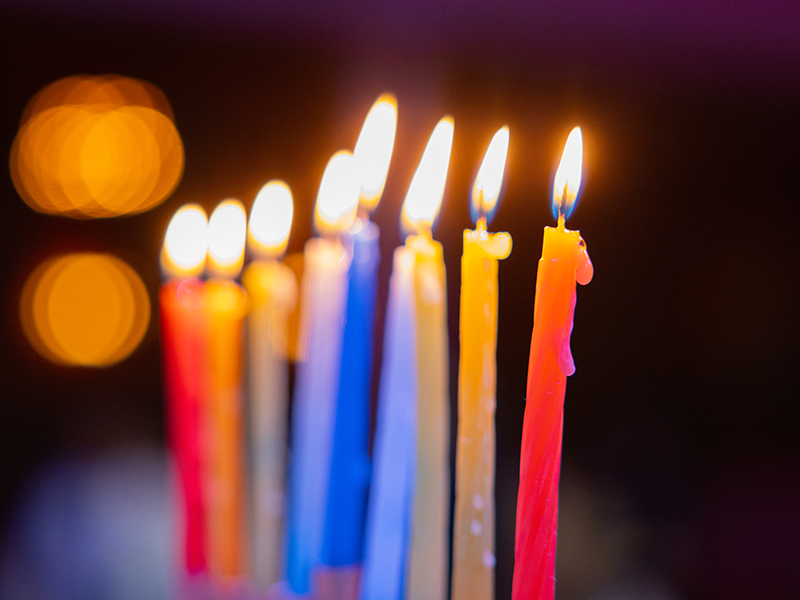Up until this winter, I had long considered myself the lone plant-killing outcast among my family of green thumbs. From childhood, I've marveled at my now 92-year-old grandfather's summer gardens that produce a bountiful harvest of herbs and vegetables each year. I was lucky to be the beneficiary of this bounty; you haven't truly lived until you've tasted a cherry tomato plucked straight off the plant you, yourself, put in the ground. When I moved to Arizona five years ago, I couldn't even manage to keep a succulent alive.
In December, though, finally blessed with a backyard of my own, I decided to try.
My wife dug a hole a foot deep into the hard Phoenix clay to make way for new soil, and I assembled the raised garden bed kit I found at the hardware store. We dreamed big, since there was nothing to lose - nowhere to go but up. I planted cauliflower, broccoli, beets, and brussels sprouts. Day after day, I went out at my lunch break to monitor their status. Any change was a victory - I expected nothing from myself, and therefore each tiny leaf or cruciferous bud filled me with indescribable joy. I was not a plant person, yet here I was (along with Grandpa Larry via daily email updates), growing a garden.
By the end of the season, buoyed by my unforeseen success, we built a second garden bed, certain that the bounty would continue.
Since then, my confidence (or perhaps my hubris) has skyrocketed and today, I can barely count how many different species of pepper I'm trying to keep alive. But, of course, now that I know I can do it, my experience of gardening has changed: I expect everything to be as it was; I expect perfection of myself; I watch each leaf and bud with trepidation, rather than wonder. Peering, three times a day, at the flowering patterns of my tomato plants, I find myself asking, "do my garden and I need to take a break?"
In another desert, in another time, my Israelite ancestors were similarly grappling with their own horticultural conundrums. In this week's Torah portion, B'har, we learn God's command that the Israelites must, every seven years, engage in a practice called shmitah. And every seven sets of seven, an ultimate shmitah, called the yovel, or Jubilee, year. These years were meant as agricultural and societal resets:
Speak to the Israelite people and say to them: When you enter the land that I assign to you, the land shall observe a sabbath of the Eternal. Six years you may sow your field and six years you may prune your vineyard and gather in the yield. But in the seventh year the land shall have a sabbath of complete rest (Shabbat Shabbaton), a sabbath of the Eternal; you shall not sow your field or prune your vineyard…it shall be a year of complete rest for the land. (Lev. 25:2-5)
There are many ways to interpret this practice of allowing the land to lie fallow in the shmitah year. We might consider it a divine reminder that we must allow ourselves to rest from the work of constantly needing to provide; we are reminded of this in later verses when God promises that there will be enough to sustain the people, even during the seventh year (and beyond). Perhaps the shmitah serves to teach us to practice an abundance mindset, rather than one of scarcity.
Another thing we might note about the shmitah year is that it isn't the Israelites who are receiving the complete rest-it is the land itself. This section of Leviticus is teaching us that sometimes the things around us, even the natural world, need a rest from our constant attention. This lesson resonates even more at a time when we stand at the edge of irreversible climate change.
I am most fascinated by the use of a very specific Hebrew term: Shabbat Shabbaton. This term, describing a "sabbath of complete rest," or a "sabbath of sabbaths," appears only in this section of Leviticus and in separate descriptions that Moses gives of holiday practices: Shabbat, and the sabbath of sabbaths, Yom Kippur. Why would the biblical text choose to create this connection between the shmitah year and the practice of the holiest day on the Jewish calendar? I think it is to remind us that we must bring some of the themes of Yom Kippur into our shmitah practices. Shmitah, as we learn in this week's portion, is not just about allowing the land to lie fallow: it is about releasing others from debt, servitude, and separation from the things that matter most to them. Yom Kippur offers us a similar release: from our vows, our mistakes, and the stories we tell about ourselves and others over the years. The power of shmitah is in the complete rest, yes, but it is also in what comes after, when we return to the tasks of living with new eyes. Rather than finding ourselves caught, year after year, in the cycle of expectation: of ourselves, others, and the world around us, shmitah forces us to pause and reevaluate. It reminds us that each planting is new and different.
I will return to my garden tomorrow, inspired , by the shmitah year, to come to my practice with new eyes. While I won't be letting my soil lie fallow, I'll use the metaphor of shmitah to help me rest from the anticipation that past plantings have created. Rather than expect what I have already done or seen, I will honor the experience for what it can teach me now. And when, God willing, that first cherry tomato ripens, I will try to reset myself, wipe clean what has been, and taste it as though for the very first time.
Explore Jewish Life and Get Inspired
Subscribe for Emails

